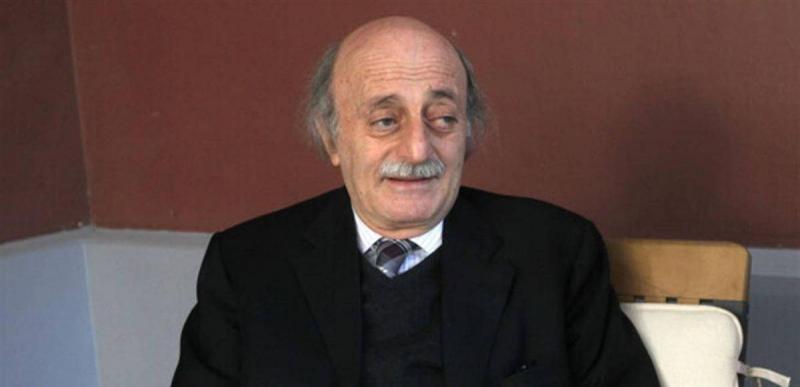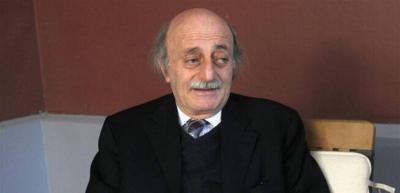There is no doubt that the recent positions of Druze leader Walid Jumblatt regarding Hezbollah and the southern front, as well as the incident in Majdal Shams, have received approval and praise from the Shiite duo. The development of these positions reached the point where Jumblatt visited the southern suburbs to offer condolences for the head of the party's military command, the jihadist leader Fouad Shukr, who was assassinated by Israel in the heart of Haret Hreik, in addition to offering condolences to Hamas political bureau chief Ismail Haniyeh, asserting that his father, Kamel Jumblatt, charted the path of Palestine which they are now following.
In fact, Jumblatt gradually evolved his positions before reaching this stage. After the opening of the support front in the south, he appealed to Hezbollah not to involve Lebanon in war, stating that he does not favor war and wishes that Lebanon would not be drawn into it, as nothing would remain of Lebanon at that point. However, he now considers that Hezbollah fulfills its duty to defend Lebanon, contrary to the views of opposition forces that have previously intersected with the Progressive Socialist Party multiple times in their political and sovereign choices, especially in refusing to vote for the Shiite duo’s candidate, former Minister Sleiman Frangieh, which justifies Jumblatt's new positions regarding his concern for Mount Lebanon and the protection and neutrality of the Druze community.
Jumblatt played a significant role in averting a potential sectarian strife between Shiites and Druze after the suspicious missile incident in Majdal Shams, which resulted in the deaths of 12 people and was exploited by Tel Aviv to incite emotions and turn the Druze against Hezbollah. Jumblatt described the Israeli claims that Hezbollah was behind the missile launch as lies and slander. More than that, it was reported that the Druze leader told party members who might be disgruntled by his new positions toward Hezbollah that anyone unhappy with his position should resign from the party. Jumblatt believes that internal conflicts should not distract from the ongoing southern front.
His positions on Gaza and Palestine are merely an extension of his father's legacy and the identity of the Jumblatt family in supporting the Palestinian cause. Al-Quds Al-Arabi posed several questions regarding the Druze leader's shift to the General Secretary of the Progressive Socialist Party, Zafer Nasser, asking about the reasons behind the former president's change from urging Hezbollah not to involve Lebanon in war to supporting it and viewing it as defending Lebanon. Nasser responded by noting that the war broke out on October 8 after Hezbollah opened the front, and Jumblatt's position was clear in calling on the party not to expand the war. The party has continued to adhere to the rules of engagement as is known.
Regarding the consideration of the party as defending Lebanon, Nasser emphasized that hostility with Israel did not arise just from the events of October 8 and that Israeli aggression against Lebanon has not stopped since 1948. Thus, their stance remains steadfast alongside southerners in resisting Israel, a reality that will persist as long as Israel continues its occupation and aggression.
When asked whether Jumblatt's position stems from fears for the community or a desire to neutralize it, Nasser clarified that Jumblatt's position arises from a historical commitment; the concern is for Lebanon because Israel is an enemy of all of Lebanon, not just one sect. The Druze community and the Progressive Socialist Party, through this position today, express clear identity and belonging.
When questioned by some who assert that Hezbollah opened the front to bolster Iran's negotiation cards rather than to defend Lebanon, the socialist leader acknowledged that nobody denies Hezbollah's relation with Iran, including Hezbollah itself. Politically, one cannot ignore the influence of any strong regional state, whether Iran or others; however, one cannot perceive those who fell in battle in the South as having fallen on behalf of another country.
Turning to the question of whether the opening of the southern front benefitted Gaza or harmed Lebanon and its southern villages, Nasser emphasized that no war comes without costs. The Al-Aqsa Flood and its aftermath, despite high costs, have reignited the Palestinian cause, and it does not seem that things will return to how they were before.
Regarding the extent of the openness between them and Hezbollah, especially after the condolence visit in the southern suburbs and the containment of the Majdal Shams crisis, Nasser noted that the internal Lebanese situation is highly complex. He stressed that while there is convergence on the Palestinian issue and support for southerners in their confrontation, it does not mean that this will result in alignment on internal matters. For instance, their stance on the presidential position is clear in terms of the necessity for agreement between various parties on a non-sectarian option.
Finally, when asked about the impact on the relationship between the Socialist Party and the opposition forces, particularly the Lebanese Forces, Nasser expressed uncertainty regarding who constitutes the opposition and what they oppose. He noted that their stance on the Palestinian issue differs significantly from many political forces, and their perspectives on the issue of southern Lebanon have long been a point of contention. He reiterated that all sides must respect each other's choices and positions since no one possesses exclusive ownership of concepts such as the state or sovereignty. Ultimately, resolving these matters among Lebanese should occur through dialogue because each party has the right to its vision for Lebanon.
It's worth mentioning that the Druze leader and the spiritual chief of the Druze community, Sheikh Sami Abi Al-Muna, have placed significant emphasis on solidarity with the southern people through calls to open up homes in the mountain region to displaced persons from border villages or the suburbs, and to take their financial circumstances into account when renting homes, despite some individual issues recorded in various villages and the difficulty of promoting openness to the environment of Hezbollah among some segments of the Druze community that still recall the events of May 11, 2008, when the party attacked the mountain area.




